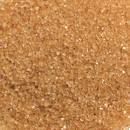Coconut sugar is the next big thing to happen after virgin coconut oil was introduced in the market about three years ago.
The raw coco sugar granules is dark brown in color like the moscuvado sugar from cane. It tastes like an ordinary cane sugar but with a difference, it smells like burnt coconut meat.
The sugar particles look rough, but felt soft in one’s hand, easily melted in the mouth and tasted only slightly sweet.
For the health conscious consumers and diabetics, it can be considered to be the best sweetener substitute once it is available in the market because of the many benefits that it has to offer.
Tests done by the Food and Nutrition Research Institute ( FNRI) and Department of Science Technology (DOST) of the Philippines has revealed a low glycemic index (GI) of 35 compared to that of cane sugar’s glycemic index of 50.
Glycemic index according to a scientist from Food and Nutrition Research Institute, is the glucose response of an individual from food relative to a standard glucose solution.
Low glucose index food is good for proper control of diabetes mellitus and it has shown to lower the LDL (low density lipoprotein) cholesterol or known as the bad cholesterol.
It has been also noted that it is also good for weight maintenance, thus preventing obesity or being overweight.
Coco sugar is 100% natural, free from additives and artificial flavoring. It is derived from the evaporating coconut sap or sweet toddy (tuba as it is known locally) through boiling in an open container where it is then allowed to cool and solidify. Coco sap if distilled, it turns into wine ( lambanog a local name which is commercially available).
If it is fermented it turns into vinegar. If cooked it turns into sugar. Comparative chemical analysis also revealed that coco sugar contains higher amount of nutrients compared to brown cane sugar.
According to the report it has some amounts of nitrogen, phosphorus, potassium, chlorine, magnesium, sulfur and micro nutrients.
Coco sugar is produced by natural process of heat evaporation with no preservatives added. Other products that can be derived from coco sap are vinegar, wine, jam, candy, health drink, honey and syrup.
Coco sugar is now commercially produced in southern Philippines. Its market demand is ever increasing in the light of the health benefits that can be derived from the wonder sugar.

